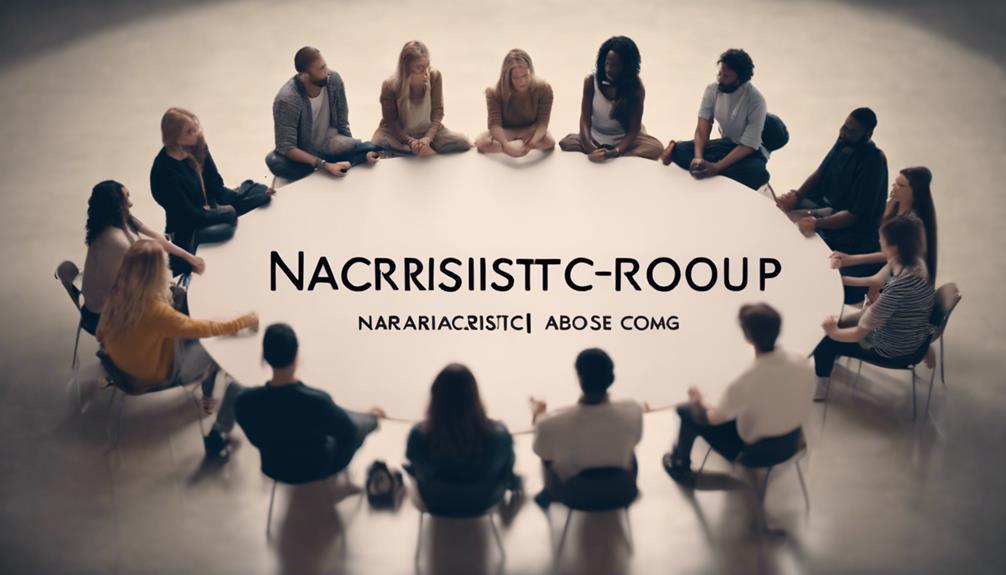Forgiveness can be a tricky part of healing from narcissistic abuse. While it might seem like a way to find peace, genuine forgiveness is hard when narcissists lack empathy and hold entitlement, making reconciliation unlikely. Sometimes, forgiving too early enables ongoing harm and prevents closure. Instead, focusing on self-awareness, setting boundaries, and practicing self-compassion offer healthier paths. If you want to understand how to navigate this delicate process, there’s more to uncover ahead.
Key Takeaways
- Genuine forgiveness can facilitate emotional release but is often hindered by narcissists’ lack of empathy and manipulative tendencies.
- For victims, forgiveness may promote healing when it focuses on self-awareness and boundary-setting rather than reconciliation.
- Narcissists’ entitlement and defense mechanisms often prevent authentic remorse, limiting forgiveness’s role in their healing process.
- Alternative healing strategies, like therapy and self-care, are crucial when forgiveness is obstructed by narcissistic traits.
- Recognizing the limitations of forgiveness in narcissistic relationships helps prioritize personal growth and emotional resilience.
Understanding Narcissistic Traits and Their Impact on Forgiveness

To understand how narcissistic traits affect forgiveness, it’s essential to recognize the core characteristics of narcissism. You’ll notice a strong need for admiration and a sense of grandiosity that makes genuine humility difficult. Narcissists often lack empathy, so they struggle to see how their actions hurt others. Manipulative behaviors, like gaslighting, are common, helping them control perceptions and emotions. Entitlement and self-centeredness lead them to prioritize their needs over others’, blocking forgiveness. They may forgive conditionally, often using it for personal gain or to assert superiority. These traits create a cycle where trust erodes, and emotional exhaustion grows. Recognizing these core traits helps you understand why forgiving a narcissist is challenging and why their forgiveness mightn’t be genuine. Additionally, their tendency toward emotional manipulation can make genuine reconciliation difficult even when they offer forgiveness. Moreover, their manipulative behaviors often undermine attempts at authentic healing and trust-building. Understanding how narcissistic traits influence emotional responses can help you navigate interactions more effectively. Being aware of the trust issues stemming from narcissistic behavior can further clarify why establishing a healthy relationship is complex.
The Impediments to Forgiving Narcissists

Narcissists often employ defense mechanisms that block genuine forgiveness, making it difficult for you to see any acknowledgment of wrongdoing. They shift blame onto you, preventing recognition of their faults. Their emotional defenses can hide hurt, making it hard to identify transgressions. Mammography guidelines can help in early detection, but narcissists may avoid such health screenings to ignore their vulnerabilities. With a lack of empathy, they struggle to understand or care about your feelings, further obstructing forgiveness. Victims are often scapegoated, increasing feelings of injustice and deepening wounds. Narcissists may deny feelings like social rejection, avoiding acknowledgment of hurt altogether. Their entitlement raises expectations for special treatment, while defensive strategies obscure reality. This emotional invisibility and denial hinder honest acknowledgment, creating significant barriers to forgiveness and healing. These dynamics trap you in cycles of hurt and unresolved pain. Furthermore, their tendency to avoid self-awareness prevents meaningful reflection on their actions, intensifying the difficulty of achieving genuine forgiveness. Additionally, their reluctance to seek emotional growth keeps them from understanding the impact of their behavior, further complicating the healing process. Moreover, their refusal to engage in accountability can perpetuate misunderstandings and prevent reconciliation.
How Narcissistic Entitlement Shapes Forgiveness Challenges

Narcissistic entitlement considerably influences how forgiveness unfolds in relationships with narcissists. When someone feels entitled, they expect special treatment and defend their rights aggressively. This mindset creates a major obstacle to forgiving because they see forgiveness as a loss of control or acknowledgment of fault. Entitled individuals often demand repayment for offenses and regret forgiving, especially if they see it as a weakness. Their diminished willingness to forgive is consistent across different scenarios, even over time. They tend to resist apologies and dismiss the validity of others’ remorse. This entitlement fuels a sense of superiority and prevents genuine reconciliation. As a result, forgiveness becomes increasingly difficult, impeding emotional healing and reinforcing harmful dynamics in the relationship. Recognizing perceptions of entitlement and their influence on perceptions of forgiveness can help in understanding these complex emotional barriers. Additionally, understanding the psychological benefits of forgiveness, such as emotional relief and stress reduction, can motivate individuals to navigate these challenges more effectively. Furthermore, the resistance to apology acceptance often exacerbates these difficulties, making it harder for victims to achieve closure. Awareness of the influence of affairs and infidelity exposure can also shed light on underlying issues that hinder forgiveness.
The Emotional Toll of Narcissistic Abuse and Forgiveness Barriers

The emotional aftermath of narcissistic abuse profoundly impacts your ability to forgive. You may feel overwhelmed by anxiety and depression, making it hard to find emotional clarity.
PTSD symptoms like flashbacks and hyperarousal can keep you stuck in painful memories, blocking the path to forgiveness.
Social isolation, often caused by manipulation and gaslighting, reduces your support network, intensifying feelings of loneliness and worthlessness.
Chronic stress damages your memory and focus, further impairing your emotional resilience.
Barriers like trauma, self-blame, and fear create internal conflicts, preventing progress.
Emotional residue from the abuse lingers, making it difficult to let go.
Understanding the emotional dysregulation characteristic of BPD can help you recognize the importance of managing intense feelings to facilitate healing.
Addressing emotional regulation strategies can be crucial in overcoming these barriers and moving toward forgiveness.
Without addressing these emotional wounds, forgiveness remains elusive, trapping you in a cycle of pain and unresolved hurt. Recognizing the impact of trauma on your emotional state can assist in developing effective coping mechanisms.
Additionally, understanding how lifestyle factors influence emotional health can support your healing journey by promoting resilience and well-being. Incorporating healthy habits and self-care practices can significantly improve your capacity to process and forgive.
Exploring Alternative Pathways to Healing Without Forgiveness

While forgiveness can be a valuable part of healing, it’s not the only path to recovery from the pain caused by narcissistic abuse. You can focus on building self-awareness by understanding past experiences and trauma that contribute to narcissistic tendencies. Engaging in therapy helps explore underlying causes, fostering empathy and emotional growth. Developing healthier coping mechanisms—like mindfulness, physical activity, and grounding techniques—can reduce stress and emotional reactivity. Building a strong support network through support groups, family, or mentors provides encouragement and guidance. Incorporating holistic practices such as meditation, yoga, and nature therapy enhances emotional regulation and self-reflection. Additionally, understanding the role of well-being solutions resources like Mother Baby Kids can offer insights into nurturing oneself during recovery. Exploring self-care strategies can also strengthen resilience and promote healing. These pathways empower you to heal, grow, and regain control without necessarily relying on forgiveness as the primary tool.
The Risks of Toxic Forgiveness in Narcissistic Relationships

Forgiving someone prematurely in a narcissistic relationship can carry serious risks, often enabling ongoing abuse rather than fostering healing. When you forgive too early, it can reinforce trauma bonds, keeping you stuck in a cycle of manipulation and emotional harm.
This type of forgiveness may prevent you from fully acknowledging the abuse or gaining closure, making it easier for narcissists to gaslight and avoid accountability. It can also increase your emotional vulnerability, leading to further manipulation and false promises of change.
Premature forgiveness might make you doubt your perceptions, deepening confusion and disillusionment. Recognizing the importance of boundaries and recovery strategies available for dealing with toxic relationships can be crucial in establishing healthy boundaries and recovery strategies. Understanding the vulnerabilities of AI systems in the context of digital safety can also help protect individuals from further emotional or psychological harm. Engaging in digital literacy programs and staying informed about cybersecurity practices can further empower you to safeguard your mental health and personal information.
Strategies for Cultivating Self-Compassion and Emotional Neutrality

Cultivating self-compassion and emotional neutrality is essential for healing from narcissistic abuse because it helps you rebuild your sense of worth and regain emotional stability. To do this, treat yourself with kindness, especially during tough times. Practice gentle self-talk and acknowledge your pain without judgment.
Releasing self-blame through forgiveness allows you to let go of guilt and shame, fostering emotional healing. Developing emotional neutrality involves managing your feelings through mindfulness, focusing on positive experiences, and accepting past events without judgment.
Engage in regular self-care, use positive affirmations, and journal your emotions to process them effectively. Incorporating physical activity and creating a supportive environment further supports emotional balance.
Consistent practice of these strategies helps restore your emotional health and nurtures resilience on your healing journey.
Empowering Recovery: Moving Beyond Forgiveness

Healing from narcissistic abuse often requires focusing on your personal growth and resilience rather than solely seeking forgiveness. Prioritize your healing by practicing self-love, which acts as a strong defense against manipulation.
Remember, you aren’t to blame for your abuser’s actions, and recognizing this can free you from guilt. Empower yourself by embracing your strength and resilience, shifting your mindset toward positive beliefs and experiences.
Avoid toxic forgiveness that may hinder your progress, and consider self-forgiveness as a crucial step in healing.
Establish boundaries, like no contact, to protect your well-being. Educate yourself about narcissistic behavior and connect with others who understand your experience.
These steps reinforce your recovery, helping you move forward with confidence and self-empowerment.
Research Insights on Narcissism and Forgiveness Dynamics

Research shows that narcissism and forgiveness are interconnected in complex ways, often making forgiveness more difficult for those with narcissistic traits. Studies reveal a negative, albeit low, correlation between narcissism and forgiveness, meaning narcissists are less likely to forgive others.
Their sense of entitlement and need for recognition act as barriers, complicating the process. Surprisingly, narcissists tend to forgive themselves more easily than others, highlighting a disparity in self-perception.
Emotional empathy deficits and defense mechanisms further hinder genuine forgiveness. In relationships, emotional stakes and power dynamics make forgiving especially challenging.
Social expectations and communication barriers also influence forgiveness efforts. Overall, narcissistic traits create significant obstacles to both forgiving and being forgiven, impacting emotional healing and relationship repair.
Frequently Asked Questions
Can Forgiveness Ever Be Healthy in Narcissistic Relationships?
You wonder if forgiveness can be healthy in narcissistic relationships. It can be, but only if it involves setting firm boundaries and acknowledging the harm done.
Forgiving a narcissist shouldn’t mean tolerating continued abuse or losing your self-respect. When you forgive with awareness, it helps you release resentment and protect your well-being.
However, be cautious—true healing often requires more than forgiveness alone.
How Do Victims Rebuild Trust Without Forgiving Their Narcissist?
Think of trust as a delicate garden you tend slowly. You don’t need to forgive your narcissist to rebuild it. Instead, focus on observing actions over time, setting firm boundaries, and surrounding yourself with supportive people.
Celebrate your progress, trust your intuition, and give yourself patience. With consistent effort and time, you’ll find your garden blooming again—stronger, healthier, and rooted in your self-trust.
What Specific Techniques Promote Emotional Neutrality After Narcissistic Abuse?
To promote emotional neutrality after narcissistic abuse, you can use techniques like the Grey Rock Method, which keeps your responses unemotional and unreactive.
Setting clear boundaries helps prevent re-engagement, while avoiding retaliation reduces emotional triggers.
Practice mindfulness to stay present and journal your feelings to process emotions.
Limiting contact and focusing on personal interests also help maintain emotional distance, enabling you to heal and regain stability.
Is It Possible to Heal Completely Without Addressing Forgiveness?
You might think healing is impossible without forgiveness, but that’s not true. You can heal completely from narcissistic abuse without ever addressing forgiveness.
Focus on self-care, setting boundaries, and emotional recovery. Your journey is about reclaiming your power, not conforming to others’ expectations.
How Does Understanding Narcissistic Traits Aid in Emotional Recovery?
Understanding narcissistic traits helps you recognize manipulative patterns and emotional abuse, giving you clarity about your experiences. This awareness enables you to detach your self-worth from the abuser’s opinions, fostering healing.
It supports setting healthy boundaries, rebuilding your self-esteem, and developing healthier coping mechanisms. By understanding these behaviors, you can process your trauma more effectively, which accelerates your emotional recovery and helps you regain a sense of control and self-identity.
Conclusion
Like Icarus soaring too close to the sun, chasing forgiveness in narcissistic wounds can lead to burnout. Remember, you hold the power to choose healing paths that don’t require sacrificing your well-being. By embracing self-compassion and setting boundaries, you reclaim your peace. Forgiveness isn’t always the destination; sometimes, liberation comes from releasing the weight of past hurts. Step into your light — your journey to healing is uniquely yours.










